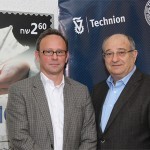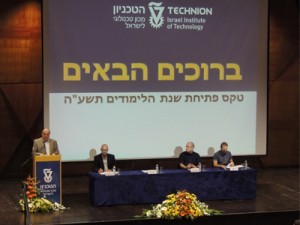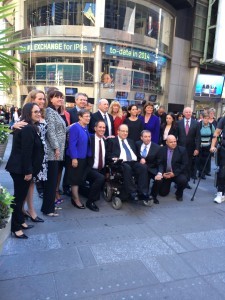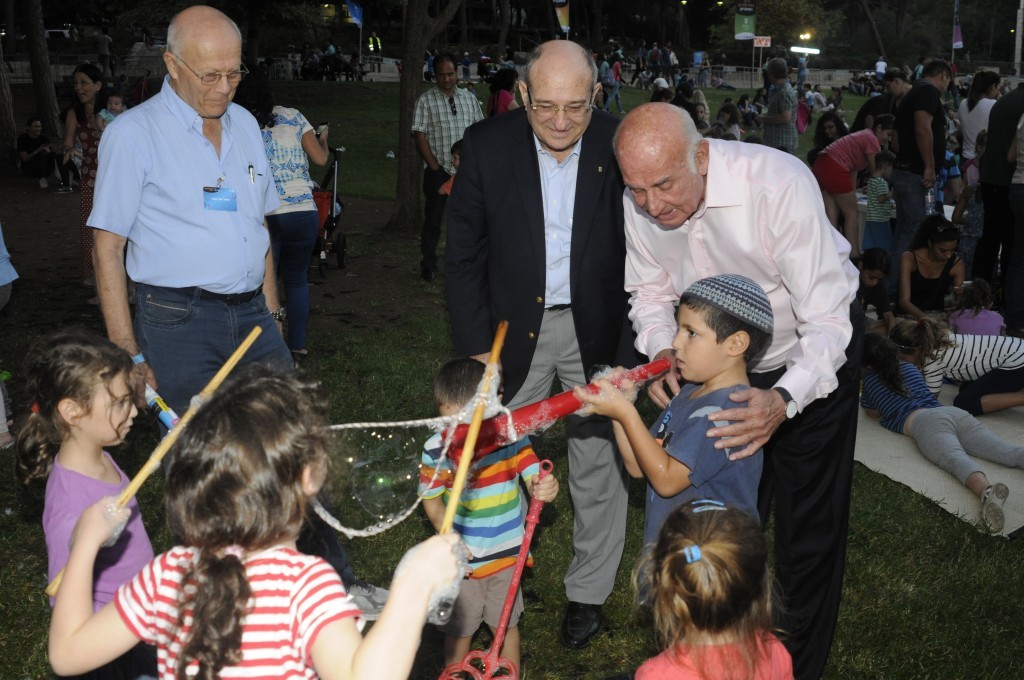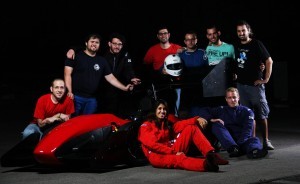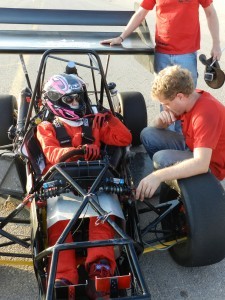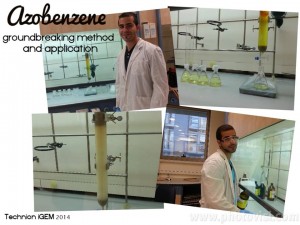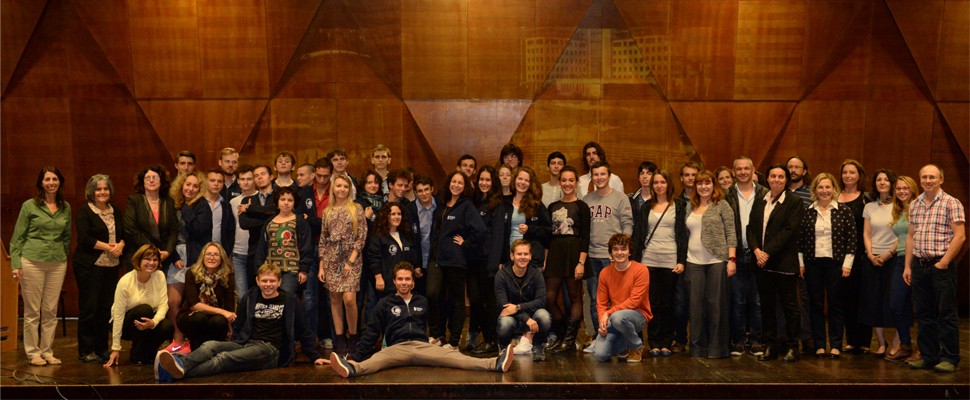
Technion celebrates the inception of classes for its second cohort of the Russian Freshman Year Program.* Graduates of the first cohort successfully integrated into regular Technion study programs at different faculties this year.
The start of the new academic year at the Technion has began with twenty-seven freshman year students from FSU countries enrolled in its Russian study program – they represent the second cohort of this unique program. At the opening ceremony, held on November 5, 2014, two of last year’s graduates, Polina Soloveichik and Andrey Elashkin, spoke about their experiences. “You gave us an opportunity to integrate into the Technion and Israel,” they said. “It’s hard to study at the Technion because here, being successful calls for more than talent alone. You find yourself studying long and hard even after a long day of classes, which leaves you with not much time for anything else. Yet the tremendous support and help by the program staff brought us to where we are today. It is because of all of you that we are now standing here as proud Technion students.”
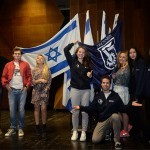 The program is managed through Technion International in cooperation with the “MASA” and “Nativ” organizations, in conjunction with the Ministry of Education, which is responsible for the Hebrew portion of the program. Prof. Anat Rafaeli, the Head of Technion International, welcomed the incoming students and told them that, “It is our goal to attract young people like you to the Technion and to Israel, and to assist you throughout this challenging integration. I can assure you that here you will receive the best science and engineering training, and request your help in undertaking your studies in these fields, as well as Hebrew language studies, very seriously.”
The program is managed through Technion International in cooperation with the “MASA” and “Nativ” organizations, in conjunction with the Ministry of Education, which is responsible for the Hebrew portion of the program. Prof. Anat Rafaeli, the Head of Technion International, welcomed the incoming students and told them that, “It is our goal to attract young people like you to the Technion and to Israel, and to assist you throughout this challenging integration. I can assure you that here you will receive the best science and engineering training, and request your help in undertaking your studies in these fields, as well as Hebrew language studies, very seriously.”
Prof. Rafaeli also thanked Naomi Ben-Ami, the Head of the Nativ organization, for her initiative and assistance that helped get the project off the ground last year. Ben-Ami thanked the staff of Technion International and expressed her hope that this program will strengthen the ties between Israel and ex-Soviet Jewry. “I wish each and every one of you much success, for those of you who choose to remain in Israel and for those who decide to return home. All of you will be our ambassadors.”
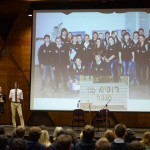 “I am touched to see so many of our graduates from the first cohort here today, who are now integrated into regular Technion study tracks, and especially to hear them speaking Hebrew,” said Ariel Geva, the Director of Technion International. “To our new incoming students – you have all demonstrated great courage on coming here – you are embarking on a long, rigorous and fascinating journey, and we want you to know that we are here to assist you with anything you will need along the way.”
“I am touched to see so many of our graduates from the first cohort here today, who are now integrated into regular Technion study tracks, and especially to hear them speaking Hebrew,” said Ariel Geva, the Director of Technion International. “To our new incoming students – you have all demonstrated great courage on coming here – you are embarking on a long, rigorous and fascinating journey, and we want you to know that we are here to assist you with anything you will need along the way.”
The first cohort opened with 22 young talented college-bound high school students from Eastern European countries,. This year, the graduates of the program have successfully integrated into various undergraduate study tracks at the Technion.
The second cohort has just opened with 27 students. As part of the program, students will take a short and concentrated preparation program (four months) consisting of mathematics, physics and Hebrew studies. In their second and third semester they will take five basic courses in engineering and sciences. In the Fall of 2015 – at the end of their first year of studies, which is given in Russian and includes 400 hours of Hebrew study – they will begin to learn with regular Technion students in Hebrew, at a faculty of their choosing.
 The Coordinator of the Russian Program, Luba Baladzhaeva, explains that in Russia and Ukraine, teens graduate from high-school at a relatively young age, and begin to look for academic study tracks. “Here at the Technion we offer high quality education and the students can start their studies immediately after their arrival to Israel.” Luba, who formerly worked for the Jewish Agency in Russia, made an Aliyah in 2009, and began working at the Technion two years ago.
The Coordinator of the Russian Program, Luba Baladzhaeva, explains that in Russia and Ukraine, teens graduate from high-school at a relatively young age, and begin to look for academic study tracks. “Here at the Technion we offer high quality education and the students can start their studies immediately after their arrival to Israel.” Luba, who formerly worked for the Jewish Agency in Russia, made an Aliyah in 2009, and began working at the Technion two years ago.
Program graduates Constantin and Grigory Senchikhin, are 18 year old twins who grew up in Moscow. They had heard about the Russian program while they were still in high school, and underwent the admissions process which involved a Skype interview and a tour of the Technion campus. “We came here in 2013, met with students and the program heads, and we decided it was a good fit for us.” The brothers received full support from their parents, who also have formal technical education and who work in the fields of tourism and insurance back home.
 Grigory, a trumpet player, dreams of studying materials engineering and Constantin, who plays the saxophone and clarinet, wants to study biomedical engineering: “In Russia, I participated at a biomedical contest for high school students called “Step Into the Future” and this field interests me very much. There are wide gaps in the level of academics at high schools in Russia, therefore, elite universities typically take in students from prestigious high schools. Although we had the privilege of studying at an excellent high school, we chose to continue our university education at the Technion, because of its impressive past and excellent faculty.”
Grigory, a trumpet player, dreams of studying materials engineering and Constantin, who plays the saxophone and clarinet, wants to study biomedical engineering: “In Russia, I participated at a biomedical contest for high school students called “Step Into the Future” and this field interests me very much. There are wide gaps in the level of academics at high schools in Russia, therefore, elite universities typically take in students from prestigious high schools. Although we had the privilege of studying at an excellent high school, we chose to continue our university education at the Technion, because of its impressive past and excellent faculty.”
Picture Credit: Technion’s Spokesperson’s Office
For more information: Gil Lainer, Technion Spokesperson, 058-688-2208



